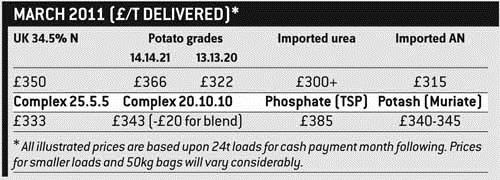Spring fertiliser prices on the increase

Grassland farmers are feeling the full effect of high fertiliser prices this month. Savings are being made by buying nitrogen rather than NPK, even though PK holidays can be risky.
Compound prices have been held, whereas UK nitrogen has leapt up to £350/t in line with continental pricing. This is a somewhat academic price as most buyers are satisfied and any top-ups will not be required until April.
With imported AN at £310-315/t and, despite turmoil in the Middle East, urea dropping back by $50/t FOB to about £300/t on-farm, it is doubtful much Nitram will be sold at £350/t.
There has been some debate concerning the relative prices of UK nitrogen against continental material with a perception that French AN is cheaper. This may be because the face value of the latter is presented as an undelivered, bulk price for 33.5% N. Add a bag, delivery and convert to 34.5% and the prices are remarkably similar. If anything, UK farm prices have been cheaper.
But, UK and continental prices are both equally influenced by global forces and the big question is what is in store for the new season? The predicted forward price for urea is $100/t above last season’s FOB price of $230/t. Add shipping, bags, transport, exchange rate and margin, and urea could be trading on-farm at £300/t. Could the UK, therefore, hope for a new season AN price of around £275/t? The new season will be interesting.
Frontier reports more farmer interest in liquid fertiliser and has recently invested heavily in on-farm liquid storage. The liquid market should be competitive as Omex has announced a new terminal at Ipswich with an estimated capacity of 450,000t and the capacity to dock larger UAN cargoes.
In the solid fertiliser market, Koch, whose acquisition of J & H Bunn completed this week, is a serious newcomer to the UK importing market. The company is bullish about prospects of taking some of the home AN market with its KaN branded urea.
This is coated with the urease inhibitor Agritain to increase the efficiency of nitrogen use. Although Agritain has been around now for some 15 years and comes with a good track record of reputable agronomic research, it has not yet been widely used in the UK. As with all products, its success will be determined by a mix of price and agronomic performance.
The new season could also be affected by market upsets brought about by recent events, both natural disaster and insurrection.
Mike Buchan, commercial director of GrowHow UK, is fond of using the word “volatile” to describe fertiliser markets. It will be hard to prove him wrong.


